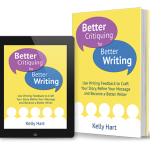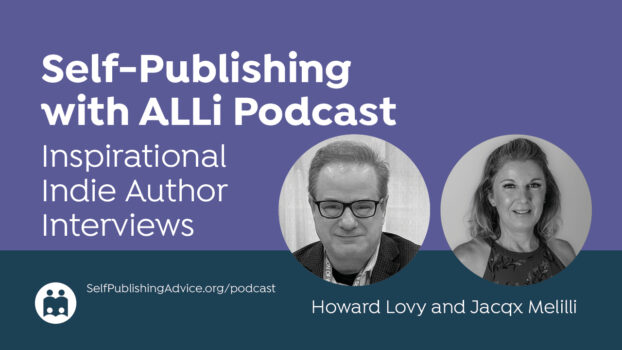What kind of feedback should you seek prior to publishing your manuscript? Kelly Hart, Australian founder of Better Scribe and author of Better Critiquing for Better Writing Skills, explains the difference between two popular processes: getting a critique and having your manuscript professionally assessed.
The main difference that writers know of between critiquing and professional manuscript assessment is the money. The assumption is that the two are almost the same, apart from critiquing being free and manuscript assessment being a paid service. This is like comparing a Toyota to a Porsche. Yes, they both get you from A to B, but the experience is very different. Let’s explore the differences between the two.
Definition of Critiquing
The process of critiquing is great for first, second and even third drafts, but for the final draft you may want to seek out an editor. After all, your critiquing group is only able to point out issues they can identify. A manuscript assessor has more experience with identifying strengths and weaknesses and will also give you advice on improving your manuscript, which may be outside of your critiquing group’s knowledge.
Definition of Manuscript Assessment
The manuscript assessment explores all the elements of your manuscript in detail, pointing out strengths and weaknesses. You receive a report and comments throughout your manuscript with suggestions and advice on how to improve the manuscript. Your critiquing group may also be very detailed in their feedback, but they will be reading and working on your manuscript in their free time. This may mean they don’t have time to digest details in your manuscript before giving feedback.
A key difference here is that a manuscript assessor will treat your manuscript as their job, giving it their undivided attention. They read and assess the manuscript as a whole, which means that they can track the plot, characterisation and other elements all the way through, making sure your manuscript stays consistent.
This contrasts with critiquing groups, where there is often a limit on the maximum amount of pages you can submit at one time. This can make it a drawn-out process for the group to go over your whole manuscript, and by the time the next meeting rolls around, they may have forgotten some of the finer details of your manuscript. This means that big picture items such as plot and character consistency may slip under the radar.
How to Find a Manuscript Assessor
- When looking for a manuscript assessor or editor, make sure you do your research. Don’t just go with the cheapest, find out what they’re offering and who they are. Check that they’re not mentioned on websites such as Preditors & Editors or Writer Beware. If they’re a member of the Alliance of Independent Authors they would have agreed to ALLi’s Code of Standards. Remember to check out their business website for testimonials and other signs of credibility.
- The other thing to look out for is that they have the experience to be a manuscript assessor. Are they an editor or published writer? If they’re a published writer, check to see if they have more than one book out and if they have carried out many other manuscript assessments. You don’t want someone practising on your manuscript.
- Lastly, if you have any questions before choosing your manuscript assessor, make sure you contact them for answers and trust your gut feeling on who you feel comfortable with.
Don't be afraid to ask questions. Sometimes the connection you make with your manuscript assessor is part of what makes the experience enjoyable and worthwhile. This is your chance to make sure your manuscript is the strongest manuscript you can create.
Remember that quality books always get the best reviews.
#Authors: definition of difference between critiques & ms assessment - by @BetterScribe for #ww Share on X







Hmm it appears like your blog ate my first comment (it was
extremely long) so I guess I’ll just sum it up what I wrote and say, I’m thoroughly enjoying your blog.
I as well am an aspiring blog writer but I’m still new to everything.
Do you have any points for newbie blog writers?
I’d certainly appreciate it.
I would like to know where to send a non fiction manuscript for assessment for libel. Is there anyone I can contact.
Lorraine
Very helpful article for writers – as a professional editor who does manuscript assessments, I appreciate the information you’ve shared and agree with what you’ve mentioned. Thank you!
[…] Also relevant to this discussion: Kelly Hart’s recent post last week for Writers’ Wednesday: What’s the Difference Between Critiquing and Manuscript Appraisal? […]
[…] Kelly Hart What kind of feedback should you seek prior to publishing your manuscript? Kelly Hart, Australian […]
Great article Kelly: I believe in the adage “If you don’t Read, You can’t Write.” It’s the same for Non-fiction, and more important in content for fiction. I write with two goals: Inform and Entertain. I rewrite as many times as necessary, until I can’t go further, then I call in an editor to contribute and use their professional expertise.
Stay well…
Warren. .
I’m interested in the term, “Manuscript Assessor.” Is that any different from “Editor?” Is it a type of editor, like developmental editor or copy editor, or is it a generalist who does all the editing in one fell swoop?
Hi Gordon,
A manuscript assessment is a specific service offered by editors and is thus a type of editing, not a type of editor, which would seek to give a specific and detailed response to the general question ‘Is this working?’. I’d further suggest that a manuscript assessment is a service you’d want from an editor who specialises in substantive editing versus a copyeditor or proofreader.
I contacted about 6 manuscript services which offered to edit my 22 eBooks.
The high end was $33,000.00
The low end was $11,100
As a disabled writer on a limited income, NEITHER of these price quotes were within my budget.